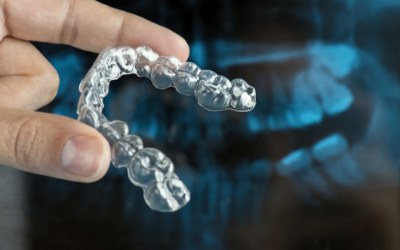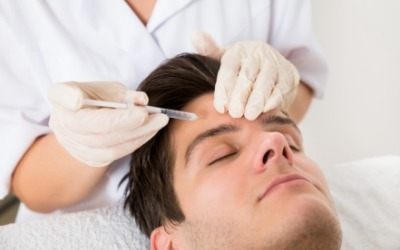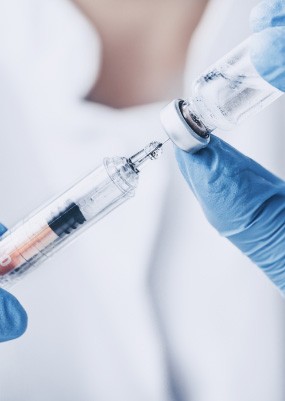Botox – Forest Park, OH
A Surprising Solution for Jaw Pain
Botox is a shortened word derived from botulinum toxin, a substance that is normally harmful to humans and animals. However, a portion of the serum is useful to temporarily paralyze muscles for cosmetic treatments and some medical and dental treatments. Common medical conditions that dentists can treat with Botox include overactive bladder, muscle weakness and spasticity, and migraine headaches.
Most people have heard of Botox, but they assume the procedure is only for cosmetic concerns and that it requires them to visit a doctor. Kemper Meadow Family Dentistry is pleased to let our patients know that we offer Botox in Forest Park, OH to treat a wide range of oral health conditions. Gone are the days when Botox was only available to reduce wrinkles and other visible signs of aging on the face. People who struggle with TMJ, bruxism, and other dental concerns can find relief by visiting our dental office for a Botox injection.

Conditions Our Dentists Treat with Botox in Forest Park, OH

Patients with any condition that primarily affects the face and jaw area may find relief from pain and other symptoms with a Botox injection. Below are examples of just some of the facial and oral health issues our dental team can treat with Botox.
Bruxism

Patients with bruxism involuntarily grind their teeth and clench their jaw, often while sleeping or in response to stress. Some people develop this issue when they have temporomandibular joint disorder (TMJ), while others experience it as a stand-alone symptom. Prolonged, untreated bruxism can damage the teeth over time. The issue can also cause people to develop persistent facial pain or headaches. Since most people remain unaware that they are clenching their jaw or grinding their teeth, the problem will only get worse if they do not seek treatment for it.
Providing patients with a night guard to wear as they sleep is typically the first type of treatment our dentists offer for this condition. Those who do not see symptom improvement after wearing the night guard for at least several weeks are good candidates to try Botox injections for relief of bruxism symptoms.
Botox injections for bruxism relax the muscles associated with teeth clenching and grinding. One of our skilled dentists injects a small amount of the serum into the muscles responsible for moving the jaw called the masseter muscles. Patients who experience headaches or facial pain may receive additional injections elsewhere on their faces. Botulinum toxin reduces unconscious clenching along with tension and pain.
Most people begin feeling relief from their symptoms within one to three days of receiving a Botox injection at our dental office near Pleasant Run. Patients should keep in mind that everyone responds differently to the injections and some people may not notice a difference for up to two weeks. The pain relief and prevention of jaw clenching typically lasts three to six months after a single injection.
TMJ Disorders

Besides teeth grinding and clenching, common causes of TMJ disorders include arthritis, a jaw injury, or a genetic predisposition to the common oral health condition. Typical symptoms associated with TMJ include:
- Clicking sounds when opening the jaw
- Difficulty or pain while chewing
- Dull, aching pain around one or both ears
- Facial pain
- Headaches
- The jaw is difficult to open due to its joints locking
- Pain in the jaw joints
As with Bruxism, Botox injections are typically not the first treatment that our dentists offer to patients struggling with TMJ symptoms. They may prescribe pain relieving medication, muscle relaxing medication, or a mouth guard first. Patients who still experience jaw and facial pain after trying other remedies can typically find relief with Botox injections. The timeline for when symptom relief first begins and how long the effect of an injection lasts is the same regardless of which oral or facial condition patients have.
Other Dental or Facial Conditions That May Respond Well to TMJ Injections

Although bruxism and TMJ are the most common reasons patients receive Botox injections from our dentists near Springdale, we also use it to treat the following conditions:
- Having the appearance of a gummy smile, which means that more gum tissue than teeth shows when a person smiles.
- High lip lines
- Masseter muscle repair, which is muscles in the jaw that allow people to chew food and are some of the strongest muscles in the human body.
- Nasolabial folds
- Orthodontic prosthesis or relapse repair
What Are the Primary Benefits of Dental Botox?

Dentists are already experts at working with facial bones and muscles, so it makes sense for patients to trust them with Botox injections. The benefits of Botox in a dental setting go far beyond physical appearance and can help people who have lived in pain for months or years finally find relief. Patients who wear orthodontic appliances or dentures can benefit from Botox injections to improve the way these items fit in their mouths.
Do Botox Injections Have Any Side Effects?

Botox injections are safe when given by a trained professional like Dr. Kulwin, Dr. Harmeyer, Dr. Maric, or Dr. VanderHorst at Kemper Meadow Family Dentistry. Patients may experience some temporary side effects after a Botox injection, including the following:
- A tight sensation around the top of the head, which usually disappears in one to two days.
- Bruising, mild pain, redness, or soreness at the injection site. These effects may take several days to develop and should not last more than a few days.
- Flu-like symptoms such as a headache, fever, or nausea.
- Temporary drooping eyelids or facial paralysis if the Botox serum unintentionally spreads beyond the original injection site.
These side effects are normal and should disappear completely by the end of the week. Patients should not hesitate to contact our dental office if side effects persist or worsen, or if they develop more serious reactions to their Botox injection. Muscle weakness and difficulty speaking or swallowing are common examples of serious side effects that may require prompt medical attention.
People seeking Botox injections for oral or facial issues should know that their body may become tolerant to them after a while, which makes them less effective. However, most people find lasting relief long before that happens.
BOTOX FAQs

If you are interested in finding out how BOTOX may be able to help you find relief from the pain associated with bruxism and TMJ disorder (TMD), our team is ready to answer your questions. However, we recognize that many people like to do their own research before booking a consultation. That is why we have compiled the following list of frequently asked questions about the BOTOX services offered in our practice. If your specific questions are not addressed here, give us a call — we love to speak with both current and prospective patients.
Is BOTOX Safe?
Because BOTOX contains a toxin, some people are reluctant to receive it. However, keep in mind that BOTOX has been used in medical settings for decades, and it has a track record of safety. As long as it is administered by a qualified professional, the risk of a severe adverse reaction is quite low. In fact, in the first 14 years after BOTOX was approved by the FDA, only 36 adverse events were reported. In most of those cases, the problem was the result of a patient’s underlying medical conditions and not the BOTOX itself.
Who Should Not Get BOTOX?
BOTOX is safe for most people, but there are certain groups for whom it is not recommended, including:
- Pregnant and breastfeeding individuals.
- People with neuromuscular disorders, such as ALS or Lambert-Eaton syndrome.
- Individuals with certain respiratory conditions.
- People with an allergy to cow’s milk protein.
Our team will thoroughly screen you before your BOTOX injections to make sure you are a good candidate for it. Your safety is very important to us!
Why Should I Get BOTOX from a Dentist?
Many different types of medical professionals offer BOTOX injections. Dentists are among the most qualified because they have an in-depth understanding of facial anatomy. That is especially valuable when BOTOX is being used to address bruxism or TMD, disorders that are not usually addressed in other areas of the medical field.
Does Insurance Cover BOTOX for TMD and Teeth Grinding?
Dental insurance does not usually cover BOTOX for TMJ disorders and bruxism. However, it is still worth calling your insurer to find out if your benefits might apply. Our team can help you file necessary claim forms. We can also help you understand your other payment options; we do not want you to run into any unpleasant surprises when you are paying for your care.
Also, keep in mind that while BOTOX can seem a bit pricey, the pain relief it provides can be truly priceless!
